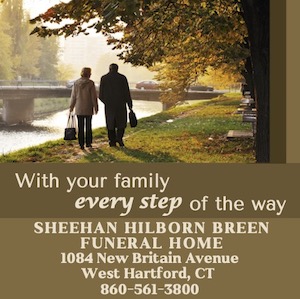HAMDEN – Dan Hecht was in fifth grade when he first stood up to an anti-Semitic incident. “My friend drew a swastika on his notebook and I told him that what he drew wasn’t okay, wasn’t the right thing to do,” Hecht says. “He shrugged it off. I dealt with the incident myself and when it was all over, I told my mom. But I didn’t want her to call the school because that would have made things worse.”
Now 14, Hecht is a Teen Trainer in Confronting Anti-Semitism (CAS), a program of the Anti-Defamation League’s Connecticut regional office (ADL). CAS is designed to empower the Jewish community to respond to anti-Semitic incidents and to challenge the persistent anti-Semitic myths and stereotypes in which many of these conflicts are rooted. Through interactive tools and role-play, the program’s workshops help Jewish teens and their families develop a strong, positive Jewish identity and acquire the tools and skills necessary to respond to insensitive behavior, bias, and prejudice.
The program was started in the ‘80s in ADL’s Boston regional office, and is run in 10 of the ADL’s 30 regional offices. Connecticut is the only office that has hired a fulltime professional coordinator for the program, and is the only one that includes Teen Trainers among its facilitators.
Sharon Citrin has served as Connecticut CAS program coordinator since 2001. “When I first observed the workshops, they were wonderful, but there was a disconnect,” she says. “Parents were saying, ‘Well, that’s all well and good, but this would never happen to my child,’ and the kids were saying, ‘This would never happen to me.”
At the time, Citrin was aware of many anti-Semitic incidents being reported to ADL, especially by young people. “I felt that, instead of telling people about them, it would be so much more effective to find students who had personally experienced anti-Semitism and to ask them to write their stories and present them at workshops.”
As a bar- and bat-mitzvah tutor, she knew many teens and their families, and had already heard stories about anti-Semitic experiences. She began recruiting Teen Trainers from among her students, as well as from the ADL’s “Names Can Really Hurt Us,” a peer-to-peer panel presentation by high-school students who have experienced, as Citrin says, “all the ‘-isms.’”
Each Teen Trainer develops his or her story into an essay, with Citrin’s help. “The point of the essay is not at all to dwell on the negativity, the trauma, and the hurt feelings surrounding the anti-Semitic incident,” she says. “The idea is to explore what lessons they learned and what lessons they could offer to other students and their families.”
And that’s the message ADL is seeking to impart through the CAS program, Citrin says. “When you experience anti-Semitism, we don’t call you a victim, because that implies shame, dis-empowerment, weakness, and sadness. We’re turning this into empowerment. You listen to these kids and feel proud to be Jewish, not ashamed. You feel compelled to stand up, speak out, and take some kind of action.”
CAS runs some 20 interactive workshops a year throughout Connecticut, almost exclusively for Jewish audiences. There are currently six active Teen Trainers and 12 professional adult trainers. Most of the workshops are geared toward students – as young as 8 – and their parents.

Adam Johnson
During Adam Johnson’s 7th-grade year, kids were starting to make jokes about Jews not being good at basketball. Johnson played on the school’s basketball team, “and when I would score, they would yell ‘Jewish!’” he says. “Kids asked me where my ‘Jew cap’ was. I told my dean and he took care of the main person creating the jokes. It calmed down 100 percent at the time, but it still goes on.” Johnson’s sister and mother were both involved in CAS, and when he turned 13 this year, he joined them as a Teen Trainer. Johnson is also an Israel advocate. For his bar-mitzvah project, he put together an educational PowerPoint presentation on the U.S.-Israel relationship and Israel advocacy, which he has shown to classes in his synagogue religious school and at the adult-education and teen-education programs run by United Jewish Federation in Stamford. He is now involved locally in AIPAC, and attended the 2010 policy conference in Washington, D.C.
Johnson’s mother, Hadar Lubin, became a trainer in ADL’s World of Difference and Confronting Anti-Semitism programs eight years ago. A psychiatrist and co-director of a trauma center, Lubin notes that it is often difficult for a teen who has experienced anti-Semitism to confide in his or her parents.
“It’s a common experience for anybody who is targeted to try to seal it over and not address it,” she says. “It’s very painful, and we want to avoid pain, and it invokes shame and embarrassment, so people don’t want to retell the incident so as not to relive those emotions.”
CAS is very sensitive to this tendency in teens, Sharon Citrin says. “Most teens won’t share these things because they’re afraid their parents will overreact, blow it out of proportion, and make it worse,” she says. “In the workshop, kids and parents learn to talk to each other and work together. We give parents an important guideline: Acknowledge your child – your child, not the incident, is number one.”

Molly Teplitzky
When Molly Teplitzky left Ezra Academy after 6th grade for the more diverse Hamden Hall, she started noticing instances of anti-Semitism. Teplitzky’s parents have long been involved in ADL, serving on state and national boards, and she joined CAS last year as a high-school junior. “I’ve always been interested in diversity and anti-Semitism and Holocaust studies,” she says. “I always wanted to help others.”
Teplitzky finds that she’s usually pretty well prepared when confronting an anti-Semitic incident. While at the wheel in Driver-Ed, she surprised her instructor by mentioning that she had taken a trip to Israel. “The instructor said she didn’t know I was Jewish and thought all Jews had brown hair and brown eyes and big noses,” Teplitzky says. “I told her that Jews were diverse, but she had only known one Jewish person growing up and assumed all Jews were the same. I said, ‘I’m Jewish, that’s not okay, I don’t appreciate you being anti-Semitic toward me and saying things that are hurtful.'”
The key, Teplitzky says, even with a friend, is to say something sooner rather than later. “It may be hard, but they need to know where you’re coming from and you need to nip it in the bud,” she says. “If you say something to somebody and they take it to heart, they may have enough awareness to stand up another person in the future.”
“Standing up is the right thing to do, even with the small things,” says Teen Trainer Dan Hecht. “That’s what happened with the Nazis – no one stood up when things started to happen. It’s a matter of telling everyone else: I went through it, and even though it was a friend of mine, I stood up for the right cause and that’s what I should have done and that’s what everybody should be doing. The ADL program helps teach people not to be scared and to stand up.”
The Teen Trainer experience is helping Teplitzky develop tools for life. “It’s definitely affecting me to have the power to speak up to somebody, even if it’s not because of an anti-Semitic comment, but if it’s anything hurtful to myself or others,” she says.
Sharon Citrin says that the workshops aren’t designed to build Jewish pride, but to strengthen already-existing Jewish pride. “Confronting Anti-Semitism is not about doom and gloom, Citrin says. “We remind our trainers that it’s okay to laugh and smile and celebrate and have a positive experience. It is great to be Jewish; we may encounter these things in our lives, but look at our Teen Trainers and how proud you can feel because they went through it and they are amazing.”
CAS goes beyond the Jewish experience, Citrin says. “The empathy we can develop through this program, and learning what it is to take the role of an ally and not be a bystander – these are lessons for all kinds of things we do in our lives,” she says. “To confront any injustice we see, to reach out to people in need – this is tikkun olam. This is what we’re doing to repair a piece of the world, and by repairing this piece of the world, it hopefully extends to everything we do. When we see the world through Jewish eyes, we’re seeing it through everyone’s eyes. And that’s what it means to be Jewish, to perform the mitzvot, and to live Jewish values.”
For more information CAS contact Cantor Sharon Citrin, CAS coordinato at (203) 288-6500, ext. 316 or scitrin@.org








 Southern New England Jewish Ledger
Southern New England Jewish Ledger








